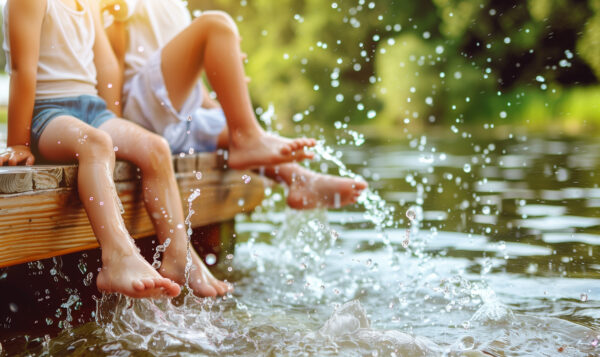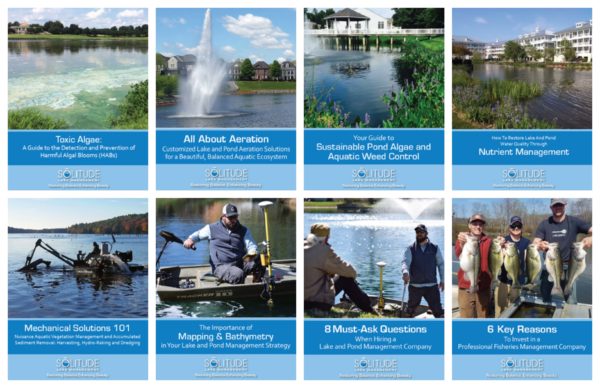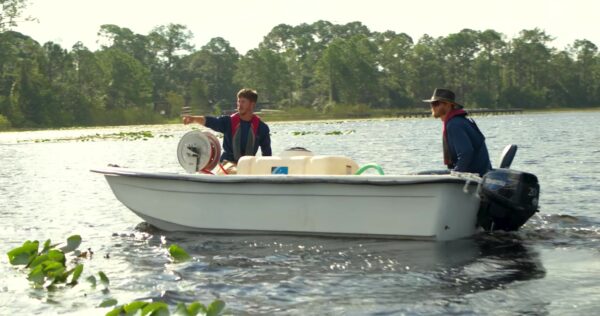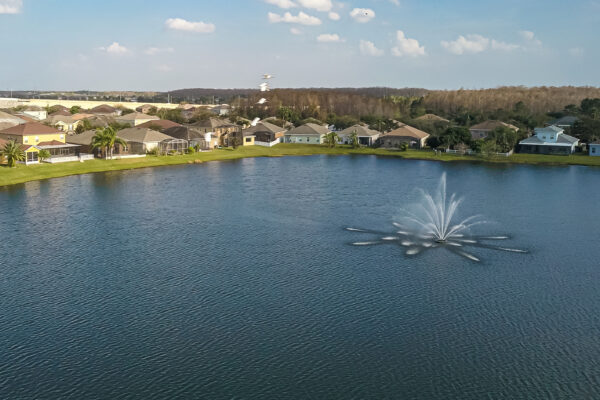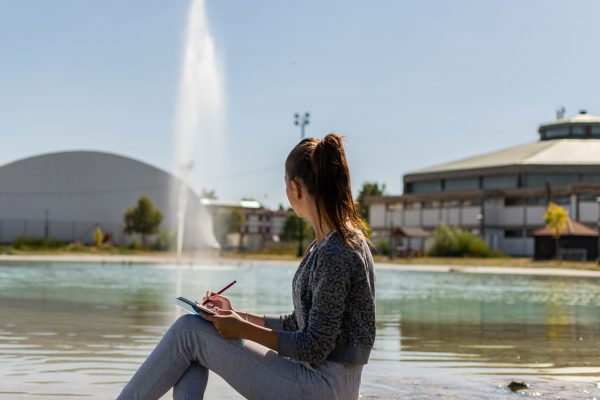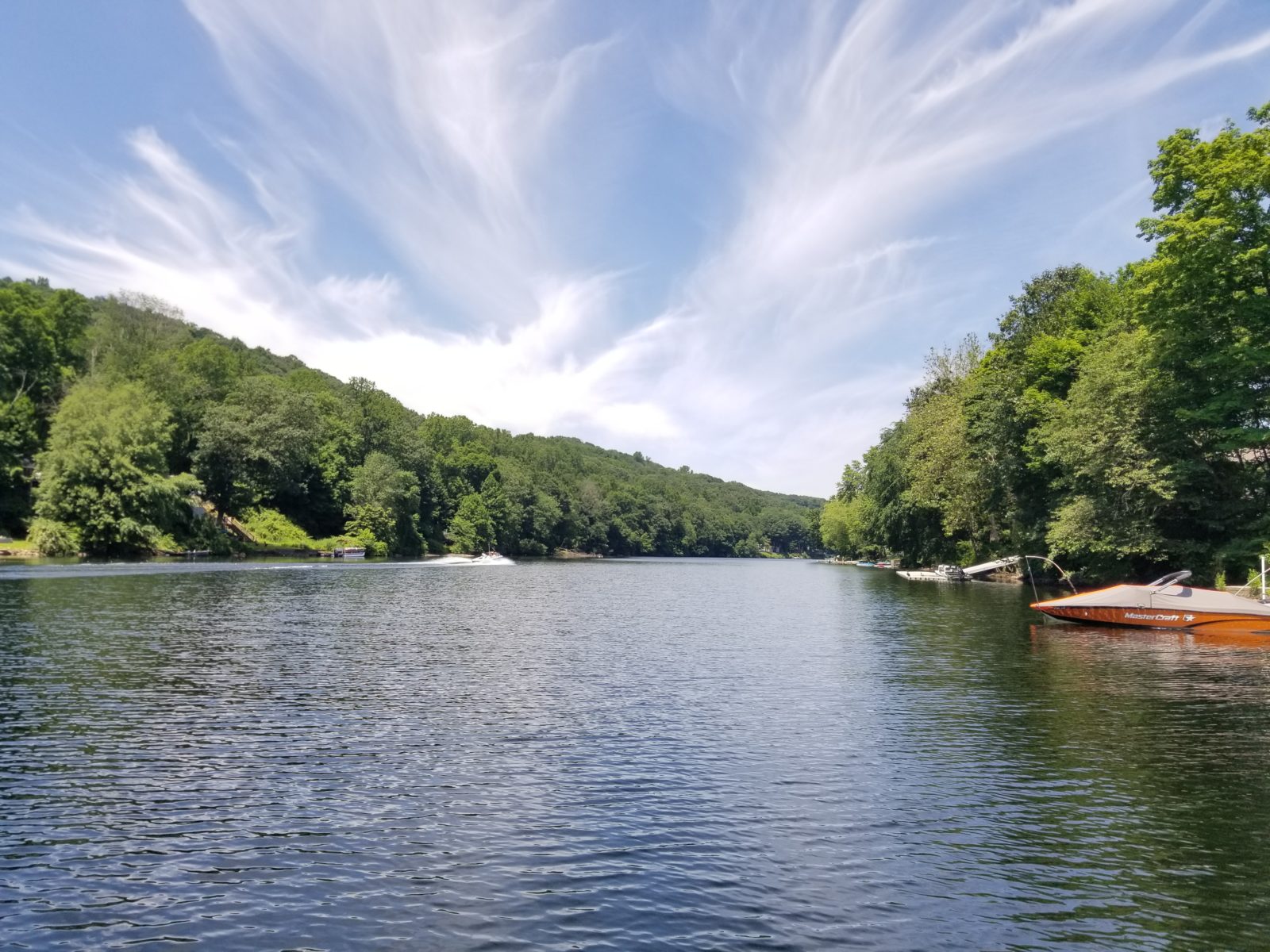Pick Up Your Pet’s Waste! It’s Polluting our Lakes & Ponds
December 6th, 2016
By Industry Expert, Derek Johnson, Certified Lake Manager and Fisheries & Wildlife Scientist
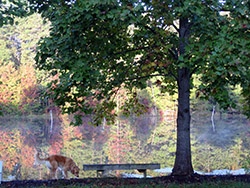 Who doesn’t love a walk through the park with their four-legged companion on a cool, crisp morning? Think about the sound of the ducks quacking in the nearby pond and the leaves crunching beneath your feet. Remember the fresh air and feel the coldness in your lungs? Imagine smelling that canine creation on your shoe from that hidden surprise beneath those leaves on the trail back there… Well, maybe not that last one. But, this has surely happened to us all, and nothing can spoil a day faster than stepping in a pile of someone else’s laziness.
Who doesn’t love a walk through the park with their four-legged companion on a cool, crisp morning? Think about the sound of the ducks quacking in the nearby pond and the leaves crunching beneath your feet. Remember the fresh air and feel the coldness in your lungs? Imagine smelling that canine creation on your shoe from that hidden surprise beneath those leaves on the trail back there… Well, maybe not that last one. But, this has surely happened to us all, and nothing can spoil a day faster than stepping in a pile of someone else’s laziness.
A common epidemic in many lake and pond communities is the issue of residents leaving their pet waste on the ground because they are under the false impression that a magical “poop elf” follows them around and will clean up after them. Unfortunately, the majority of cryptozoologists believe that poop elves do not exist, and therefore, picking up waste should be the responsibility of the pet owner. And those who don’t pick up after their pet are causing more than a simple annoyance for their neighbors; they are contributing to the pollution of our waterbodies.
In communities that have many homes centered on a lake or pond, any open space in which a dog can roam is seen as a luxury. In no time at all, these open spaces can become very concentrated with dog droppings. Due to diet, dog feces do not break down as fast as wild animal feces and can begin to accumulate very quickly. And when there is a large concentration of this stuff in one place and it rains, stormwater runoff allows it to easily flow directly into a lake, pond or other waterbody. This is a health concern for humans as well as other organisms that might come in contact the water. E. coli, giardia, and salmonella are just a few of the bacteria found in dog feces, and parasites such as roundworms, hookworms, and cryptosporidium are also present. All of these can be transported in dog waste and all are easily transferred to humans and other animals.
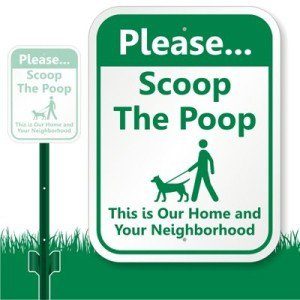 Dog feces that enters the water through runoff also introduces an increased amount of nutrients into lakes and ponds. The increased addition of these nutrients may lead to more severe algae blooms or other water quality problems. Cyanobacteria, commonly called blue-green algae, are a growing concern in our waterbodies. When a toxic blue-green algae bloom is left uncontrolled, it may result in a loss of drinking water, restrictions on recreational activities, and limit where fish can live. This type of algae relies on ample amounts of nitrogen to survive, which just so happens to be the main ingredient in dog feces. It is important for residents to understand that “out of sight, out of mind” isn’t an excuse, and there are consequences to leaving their pets waste on the ground.
Dog feces that enters the water through runoff also introduces an increased amount of nutrients into lakes and ponds. The increased addition of these nutrients may lead to more severe algae blooms or other water quality problems. Cyanobacteria, commonly called blue-green algae, are a growing concern in our waterbodies. When a toxic blue-green algae bloom is left uncontrolled, it may result in a loss of drinking water, restrictions on recreational activities, and limit where fish can live. This type of algae relies on ample amounts of nitrogen to survive, which just so happens to be the main ingredient in dog feces. It is important for residents to understand that “out of sight, out of mind” isn’t an excuse, and there are consequences to leaving their pets waste on the ground.
There are approximately 60 million dogs in the U.S., and each one “goes potty” multiple times a day. This creates a large potential for the contamination of our waters. Residents should work together to create awareness regarding the negative results of leaving their pet waste on the ground, especially when it is near water. The best methods for dealing with dog waste are to seal it in a bag and dispose of it in the regular trash or to flush it so it will be treated along with other sewage.
Download Free Report: 8 Questions to Ask When Hiring a Lake Management Company
Contact the experts at 888-480-5253 for all of your lake, pond and fisheries management needs.
Derek Johnson is a Lake Management Scientist, Fisheries & Wildlife Scientist and Certified Lake Manager with SOLitude Lake Management. Derek joined our team in southeastern Virginia shortly after completing a Master of Science degree in Lake Management from SUNY Oneonta in Upstate New York. He was the first graduate, internationally, with a degree specifically in lake management. Through his degree and related work experience, Derek also earned the designation of Certified Lake Manager through the North American Lake Management Society, an organization that brings scientists and professionals together to foster the management and protection of lakes and reservoirs.
is a Lake Management Scientist, Fisheries & Wildlife Scientist and Certified Lake Manager with SOLitude Lake Management. Derek joined our team in southeastern Virginia shortly after completing a Master of Science degree in Lake Management from SUNY Oneonta in Upstate New York. He was the first graduate, internationally, with a degree specifically in lake management. Through his degree and related work experience, Derek also earned the designation of Certified Lake Manager through the North American Lake Management Society, an organization that brings scientists and professionals together to foster the management and protection of lakes and reservoirs.
SOLitude Lake Management is committed to providing full service lake and pond management services that improve water quality, preserve natural resources, and reduce our environmental footprint. Lake, pond and fisheries management services, consulting, and aquatic products are available nationwide. Learn more about SOLitude Lake Management and purchase products at www.solitudelakemanagement.com.

